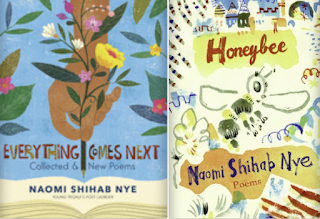Thursday, April 22, 2021
National Poetry Month: #haikudiary.23 and Poetry Friday
National Poetry Month: #haikudiary.22
Wednesday, April 21, 2021
National Poetry Month: #haikudiary.21
Tuesday, April 20, 2021
National Poetry Month: #haikudiary.20
Monday, April 19, 2021
National Poetry Month: #haikudiary.19
Sunday, April 18, 2021
National Poetry Month: #haikudiary.18
Saturday, April 17, 2021
National Poetry Month: #haikudiary.17
Text Set: Short Texts for Grades 3-8
Texts for this Text Set have been posted daily on Instagram.
Follow @TextSets there to get daily updates!
As teachers, we are always looking for quality short texts. Short texts are great for mini lessons, read aloud, book clubs and more. I've been finding so many great new publications with short pieces that I wanted to share them. The books I'll share this week are best for grades 3-8. I haven't necessarily read these books cover to cover and that is part of the beauty of these books--they offer short, stand alone pieces. When I get books like this, I usually do a pretty intense preview to get a sense of features and format. Then I read a few to get a sense of what is in the pages. I then dip in and out of them when I am looking for something specific.
I love Wonder Women of Science, a new book filled with women in science. The subtitle, "Twelve Geniuses Who Are Currently Rocking Science, Technology, and the World" says it all. This book shares the stories of incredible women and their journeys to the work they do now. Each 10-20 page piece has facts, photos from childhood, and more. Readers learn about the people behind the science as well as a bit of science. There is so much to each one of these mini-biographies.
Thursday, April 15, 2021
Poetry Friday -- Three for Earth Day
We act like there's time.

















